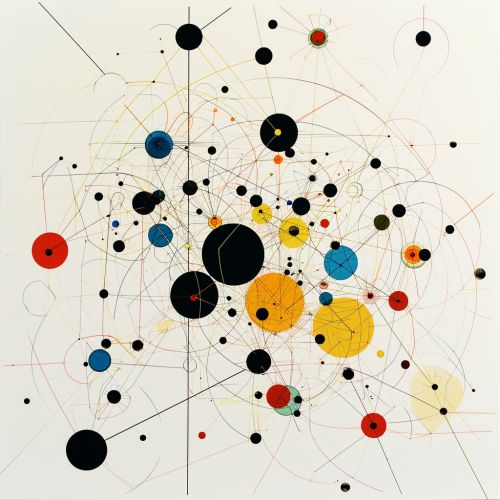Topological space
Definition
A topological space is a set endowed with a structure, called a topology, which allows defining continuous deformation of subspaces, and, more generally, all kinds of continuity. A topology is defined in terms of open sets, which are sets satisfying certain properties in relation to the structure. The study of topological spaces forms the broad field of topology.
Basic Concepts
Topological spaces are the most general spaces used in topology. The definition of a topological space relies only upon set theory and is the most general notion of a mathematical space that allows for the definition of concepts such as continuity, compactness, and convergence. Other spaces, such as manifolds and metric spaces, are specializations of topological spaces with extra structures or constraints.
Open Sets
The primary building block of a topology is the concept of an open set. In a topological space, an open set is a subset that, intuitively, does not include its boundary, in some sense. The exact definition of an open set is abstract and relies only on the notion of a set, without any structure imposed on it.
Closed Sets
A closed set is the complement of an open set; thus, it is a set that includes its boundary. The concepts of open and closed sets are central to the definition of a topological space.
Neighborhoods
A neighborhood of a point is a set containing an open set that contains the point. The neighborhood concept describes what it means for points to be "close" in a topological space.
Properties
Topological spaces have various properties that make them particularly useful in certain branches of mathematics. These properties, such as compactness, connectedness, and continuity, are fundamental to many areas of mathematics, including analysis, algebra, and geometry.
Compactness
A topological space is said to be compact if any of its open covers has a finite subcover. Compactness is a generalization of the notion of a set being bounded and closed in Euclidean space.
Connectedness
A topological space is connected if it cannot be divided into two disjoint nonempty open sets. Connectedness is the topological equivalent of a space being in one piece.
Continuity
A function between topological spaces is called continuous if the preimage of every open set is open. This is the most general form of the concept of continuity as it is known in calculus.
Types of Topological Spaces
There are many types of topological spaces studied in topology, each with its own unique properties and structures.
Metric Spaces
A metric space is a type of topological space where a metric (a function defining a concept of distance) is defined.
Manifolds
A manifold is a topological space that locally resembles Euclidean space. Manifolds are used in physics and engineering to describe spaces that may be curved or otherwise not flat.
Hausdorff Spaces
A Hausdorff space is a topological space in which distinct points have disjoint neighborhoods. This property is often considered in the study of topological spaces and is one of the separation axioms.
Applications
Topological spaces have applications in various areas of mathematics. They are used in analysis, algebra, and geometry, as well as in applied fields like physics and engineering.
Analysis
In analysis, topological spaces provide a general framework for dealing with concepts such as continuity, limits, and convergence.
Algebra
In algebra, topological spaces are used to study algebraic structures in a way that takes into account the notion of "closeness" or limits.
Geometry
In geometry, topological spaces are used to study shapes and spaces, allowing for a rigorous treatment of concepts like continuity and compactness.
Physics
In physics, topological spaces are used in the study of space-time, quantum mechanics, and statistical mechanics, among other areas.
Engineering
In engineering, topological spaces are used in the study of networks, particularly in electrical and computer engineering.
See Also


